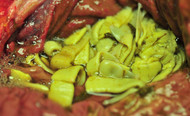Treatment Of Tapeworm In Horses
Posted by Ben Watson on 25th Feb 2016
For a full list of products go to our horse wormers page
The Royal Veterinary College and Austin Davis Biologics Ltd, providers of EquiSal Tapeworm testing, have been awarded a research grant by Petplan Charitable Trust for a project entitled: "Improved control of the equine tapeworm, Anoplocephala, through new insights into the biology of the oribatid mite intermediate host.”
The Royal Veterinary College and Austin Davis Biologics Ltd, providers of EquiSal Tapeworm testing, have been awarded a research grant by Petplan Charitable Trust for a project entitled: "Improved control of the equine tapeworm, Anoplocephala, through new insights into the biology of the oribatid mite intermediate host.”
Anoplocephala perfoliata, the most common adult tapeworm of horses worldwide, is found at the junction between the small intestine and caecum. Tapeworm infection levels have been linked with colic caused by ‘telescoping’ of the caecum, caecal perforation, peritonitis and intestinal obstruction. Although resistance to drug treatment has not yet been reported in tapeworms, increasingly frequent reports of resistance in other equine worms, such as small redworms, make it imperative for tapeworm burdens to be managed in horses carefully, especially as only two drugs are available for effective treatment.
Professor Mark Fox, of the Royal Veterinary College, comments “Infected horses pass tapeworm eggs in their faeces which are ingested by oribatid mites, an essential part of the tapeworm’s life cycle, that are found on the pasture. Larval tapeworms develop inside the mites within 8-20 weeks after which they can infect grazing horses. Despite methods available for the detection of Anoplocephala infections in horses, we still know little about the biology of the parasite’s larval stages in these mites or of seasonal patterns of transmission to horses at pasture.”
The research project will monitor three horse premises, known to be infected with tapeworms. Routine sampling of pastures will monitor mite populations and identify the level of infected mites present, together with horse saliva testing to monitor tapeworm infection within horses grazing the paddocks. The study will determine the effect of seasonal changes on mite populations; investigate the impact that dung removal has on tapeworm control; determine the effect of deworming treatments for tapeworm; and define whether infected mites exhibit behavioural changes which may increase their likelihood of being ingested.
Dr Corrine Austin, director of Austin Davis Biologics, commented, “We are very pleased to be carrying out this research with the Royal Veterinary College. It will be exciting to use EquiSal Tapeworm testing to understand further the complex balance between the tapeworm, its hosts – the horse and oribatid mite, and its environment. The project seeks to develop more effective parasite control programmes which, together with paddock management recommendations, will ultimately result in a reduction in deworming treatments required.”
Austin Davis Biologics Ltd is a small, family-run diagnostic and life sciences business which provides the EquiSal Tapeworm testing service (launched in April 2014). EquiSal Tapeworm detects tapeworm-specific antibodies in horse saliva to provide a tapeworm burden diagnosis of low, borderline or moderate/high. The test has been fully validated and shown to be accurate using samples from horses examined post mortem where tapeworms were counted. Horse owners simply send saliva samples back to the Austin Davis Biologics laboratory where scientists use automatic liquid handling equipment to carry out ELISA testing. Results are either reported directly to the horse owner or through stockists of the saliva collection kits.
A complete list of horse wormers are available here

